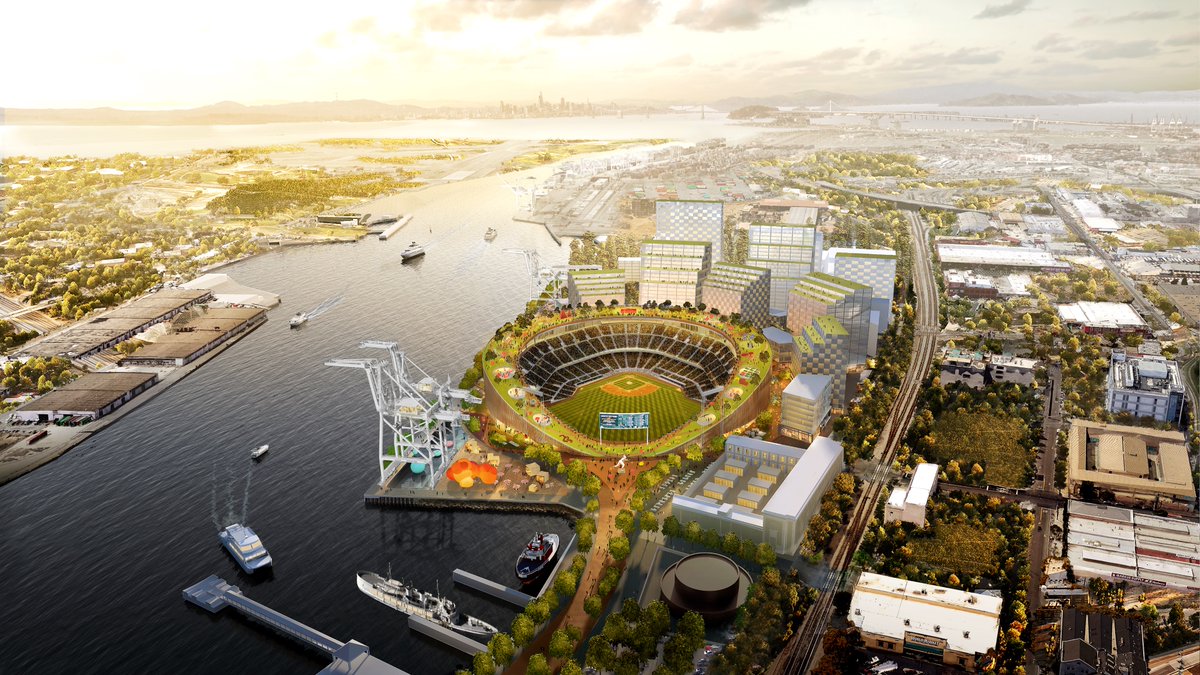The Oakland Athletics have filed suit demanding state regulators crack down on a metal shredding business next to a proposed Howard Terminal waterfront, saying that the state fails to prevent toxic emissions affecting the entire area.
Schnitzer Steel isn’t named in the suit, but it’s the ultimate target of the lawsuit. The A’s want the California Department of Toxic Substances Control to enforce state law and prevent toxic emissions caused by fires at the metal-shredding site. The A’s are pitching a mixed-use development complex on the Howard Terminal waterfront featuring a new ballpark, but the site has traditionally been an industrial site. Schnitzer Steel, as well as other shipping and industrial firms in the area, have filed suit against the city and the A’s to prevent the Howard Terminal waterfront development.
It’s a complex issue. On the one hand, the Athletics are proposing a dramatic reimagining of the Oakland waterfront, seeking to move past its industrial uses with the mixed-use development, but having a metal-scrapping site operating at the same time the A’s are playing night games does impact the fan experience. The industrial firms, meanwhile, say that the location makes it a perfect site for its current uses, and displacing those firms means losing solid middle-class jobs. Basically, it’s a gentrification battle writ large.
A’s president Dave Kaval positions the lawsuit as transcending the A’s efforts to build a waterfront ballpark, saying that it’s meant to help city residents: “This is a regulatory failure, it’s wrong, it needs to stop. We feel a sense of responsibility to take action to make sure laws are enforced,” he said in a local newspaper interview. He does have a point: West Oakland residents have been diagnosed with higher incidents of respiratory issues because of proximity to the waterfront businesses. But make no mistake: this was a warning shot against Schnitzer Steel, which the firm acknowledges:
Colin Kelly, director of public affairs at Schnitzer Steel, said the lawsuit is “nothing more than an acceleration of the A’s efforts to dismantle the Port of Oakland to make room for their waterfront stadium and luxury housing development.”
“The men and women that work at the Port have been clear that the A’s plan is incompatible with their work and will put at risk many of the last high-paying, blue collar jobs held by local Black residents in Oakland,” Kelly said in a statement. “Suing the state agency that regulates industrial businesses is an attempt by the A’s to distract from the lack of information and accountability they have demonstrated in their planning for a commercial real estate development at the working waterfront.”
There may be an inadvertant truth portrayed here: placing a ballpark and a mixed-use development at Howard Terminal means some tremendous displacement and some huge changes to a large industrial and shipping area. The community relies on the good middle-class jobs created by these firms, and however cool the prospect is of gentrifying what could be a scenic area, this gentrification will be opposed by many different groups for many different reasons–and given the regulatory and legal frameworks at work in Oakland and California, the new development may not be worth the effort in the long run.
The A’s have been working on two tracks in an effort for a new ballpark, planning a Howard Terminal project while also working on a potential acquisition of the Oakland Coliseum site. Acquiring the Coliseum site, which includes both the ballpark and the Oakland Arena, would give the A’s some options. The team had been promoting a plan for a privately financed ballpark a the downtown waterfront Howard Terminal site, and a key economic component of that plan was generating future revenue from a redeveloped Coliseum site. But earlier this summer the Athletics said the Howard Terminal plan may end up being delayed or even scrapped, which could launch a new plan to build a new ballpark next to the Coliseum, tear down the Coliseum and then redevelop the area with mixed-use amenities, dropping the notion of a sports park.
RELATED STORIES: Oakland shifts course, looks to sell Coliseum site to Athletics; A’s may delay, alter future Oakland ballpark plan; Port Director: We Can Make Howard Terminal Ballpark Work; Alameda County Opts to Sell Share of Coliseum Site to A’s; Alameda County to Vote on Oakland Coliseum Land Sale Monday; Hurdles Remain in A’s Pursuit of Howard Terminal Ballpark; Lawsuit Over Potential Oakland Coliseum Land Sale Dropped; Oakland Will Negotiate Coliseum Property with A’s; Oakland A’s Make Offer to City for Coliseum Property; Alameda County Calls on Oakland to Drop Coliseum Lawsuit; Governor’s Signature Moves A’s Howard Terminal Ballpark Bills Forward; Manfred: No, the A’s Are Not Moving to Las Vegas; Oakland Could Drop Lawsuit Over Potential Coliseum Land Sale; Manfred Said to Have Threatened Potential A’s Move to Vegas; Oakland Sues Alameda County Over Potential Coliseum Land Sale; Howard Terminal Ballpark Bill Advances; Oakland, Alameda Sparring Over Potential Coliseum Land Sale; Oakland Balks Over Potential Sale of Coliseum Land to A’s; A’s Howard Terminal Pitch Draws Opposition from Port Stakeholders; Transit Central to Howard Terminal Ballpark Planning; City Council Backs Two State Bills for A’s Howard Terminal Ballpark; Oakland City Council: We Won’t be Rushed on Howard Terminal Decision; Economic Benefits of New Oakland Athletics Waterfront Ballpark: $7.3B

